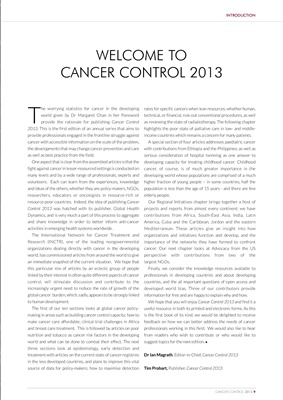
INTRODUCTION
WELCOME TO
CANCER CONTROL 2013
T
he worrying statistics for cancer in the developing rates for specific cancers when lean resources, whether human,
world given by Dr Margaret Chan in her Foreword technical, or financial, rule out conventional procedures, as well
provide the rationale for publishing Cancer Control as reviewing the state of radiatiotherapy. The following chapter
2013. This is the first edition of an annual series that aims to highlights the poor state of palliative care in low- and middle-
provide professionals engaged in the frontline struggle against income countries which remains a concern for many patients.
cancer with accessible information on the scale of the problem, A special section of four articles addresses paediatric cancer
the developments that may change cancer prevention and care with contributions from Ethiopia and the Philippines; as well as
as well as best practice from the field. serious consideration of hospital twinning as one answer to
One aspect that is clear from the assembled articles is that the developing capacity for treating childhood cancer. Childhood
fight against cancer in lesser-resourced settings is conducted on cancer, of course, is of much greater importance in the
many levels and by a wide range of professionals, experts and developing world whose populations are comprised of a much
volunteers. Each can learn from the experiences, knowledge higher fraction of young people – in some countries, half the
and ideas of the others, whether they are policy-makers, NGOs, population is less than the age of 15 years - and there are few
researchers, educators or oncologists in resource-rich or elderly people.
resource-poor countries. Indeed, the idea of publishing Cancer Our Regional Initiatives chapter brings together a host of
Control 2013 was hatched with its publisher, Global Health projects and reports from almost every continent; we have
Dynamics, and is very much a part of this process to aggregate contributions from Africa, South-East Asia, India, Latin
and share knowledge in order to better inform anti-cancer America, Cuba and the Caribbean, Jordon and the eastern
activities in emerging health systems worldwide. Mediterranean. These articles give an insight into how
The International Network for Cancer Treatment and organizations and initiatives function and develop, and the
Research (INCTR), one of the leading nongovernmental importance of the networks they have formed to confront
organizations dealing directly with cancer in the developing cancer. Our next chapter looks at Advocacy from the US
world, has commissioned articles from around the world to give perspective with contributions from two of the
an immediate snapshot of the current situation. We hope that largest NGOs.
this particular mix of articles by an eclectic group of people Finally, we consider the knowledge resources available to
linked by their interest in often quite different aspects of cancer professionals in developing countries and about developing
control, will stimulate discussion and contribute to the countries, and the all important questions of open access and
increasingly urgent need to reduce the rate of growth of the developed world bias. Three of our contributors provide
global cancer burden, which, sadly, appears to be strongly linked information for free and are happy to explain why and how.
to human development. We hope that you will enjoy Cancer Control 2013 and find it a
The first of our ten sections looks at global cancer policy- useful resource in both its printed and electronic forms. As this
making in areas such as building cancer control capacity; how to is the first book of its kind, we would be delighted to receive
make cancer care affordable; clinical trial challenges in Africa feedback on how we can better address the needs of cancer
and breast care treatment. This is followed by articles on poor professionals working in this field. We would also like to hear
nutrition and tobacco as cancer risk factors in the developing from readers who wish to contribute or who would like to
world and what can be done to combat their effect. The next suggest topics for the next edition. l
three sections look at epidemiology, early detection and
treatment with articles on the current state of cancer registries Dr Ian Magrath, Editor-in-Chief, Cancer Control 2013
in the less developed countries, and plans to improve this vital
source of data for policy-makers; how to maximise detection Tim Probart, Publisher, Cancer Control 2013
CANCER CONTROL 2013 9